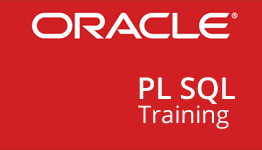About Oracle PL SQL Online Training
PL/SQL is defined as database oriented programming language which extends Oracle SQL with the help of procedural capabilities. This language offers more execution potentials rather than simple inserts, selects, updates, and deletes.
It also offers the procedural extension which allows the variables declaration Modularity, Loops, Other Error handling, logic constructs.
Course objectives of PL/SQL:
Soon after the successful completion of Oracle 10g PL/SQL the learners would be able to write functions, Triggers, Stored procedures, Packages, and to implement the complex business rules.
Here the students will come across the numerous programming concepts, security issues, when working with different PL/SQL program units. Programming topics here includes stored procedure features and the triggers creation.
Who can learn this course?
This program is mainly intended for Fresher’s, Software Professionals, Computer science graduates who is willing to learn PL/SQL Programming Language and plan their career as PLSQL Developer.
Prerequisites:
Learners must possess logical skills and sound technical knowledge.
Why learn PL/SQL?
PL/SQL is considered as one of the key for various programming languages which ever been embedded in Oracle Database, along with Java, SQL.
Learners can grasp the subject from the certified trainers and the highly experienced professionals which helps the learners to work in real time projects.
Oracle PL SQL Online Course Summary
This online course is been designed by PLSQL Database Experts to enhance and expertise the skill set of Data base and our expertise professionals train the learners to become the successful PLSQL developers.
The topics covered under this course are as follows:
Basics of PL/SQL
- Architecture of PL/SQL
- PL/SQL and SQL*Plus
- PL/SQL structures
- PL/SQL Basics, Constants, Error handling, variables, Data types,
- PL/SQL wrapper utility
Simple blocks
- PL/SQL records
- Control structures
- Describes the Significance of Variables - PL/SQL
- Recognize the Basic PL/SQL Block with Its Sections
- Distinguish between PL/SQL, Non-PL/SQL Variables
- Variables and Constants declaration
- Error checking
- Exception handling
- PL/SQL Block Execution.
Defining Exceptions
- Usage of others clause: When
- Ensure complete error checking.
- To pass error messages to call routine.
- Boolean logic- PL/SQL
Control Structures Uses and Types:
- Construction of IF Statement
- To Construct and Identify Different Loop Statements
- To Control and block the flow by Labels and Nested Loops
- Usage of “Logic Tables”.
- Structure of If-then-else.
- Testing : Numbers, Booleans, Characters
- PL/SQL Cursors
Basics Cursor
- Using a cursor for a multi-row SQL query.
PL/SQL Iterations:
- For loop
- PL/SQL tables
- While loop
PL/SQL Tables
- Define PL/SQL tables
- Why to use PL/SQL tables
- Retrieve from the PL/SQL table
- Usage of Dynamic SQL in PL/SQL
How to create the dynamic SQL statement
PL/SQL Nested blocks
Introduction to Dbms_sql package
- To Create the dynamic SQL statement
- PL/SQL Triggers
Triggers and database events
- Definition of an trigger
- Trigger timing
- To Enable and Disable the trigger
- Functions, Stored procedures, packages
Basics of stored procedures
- Function Basics.
- Package Basics.
- Defining stored procedures & functions.
- Function and stored procedures prototypes.
- To pass arguments with respect to functions, stored procedures.
- To recompile the stored procedures and functions.
Package forward declaration
- Package overloading
- Package dependency
- List of package information
PL/SQL- Bulk
- Bulk- queries
- Using cursor attributes
- Bulk DML
- To Analyze the impact of bulk operations
Frequently Asked Questions
Reviews
Not reviewed yet
